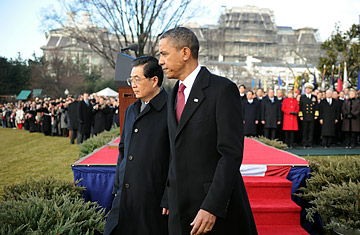
President Barack Obama and Chinese President Hu Jintao walk on the South Lawn at the White House in Washington
The reason Presidents Barack Obama and Hu Jintao went to such great lengths during Wednesday's White House lovefest to declare that the U.S. and China can get along in peace and prosperity for years to come is that neither man is convinced they will. In fact, the U.S. and China are entering a dangerous two-year period during which the pressures for confrontation are as likely to build as they are to abate.
It was partly in the hope of defusing already mounting pressures on both sides that Obama and Hu went to such lengths of civility. Major power centers on both sides want a more confrontational policy. The Chinese military, driven by nationalism and self-interest, has accelerated its push for a blue-water navy and expanded its claim to the South China Sea. State-run industries, and their protectionist backers in the State Council, have sought to tighten access to China's manufacturing contracts. And the propaganda department of the Chinese Communist Party has heightened the rhetoric of confrontation.
At the same time in the U.S., calls for economic punishment of Beijing are growing louder — and more politically popular. In September, the House passed by 348 votes to 79 a bill that would slap tariffs on China's exports in retaliation for it manipulating its currency value, which the bill's authors believe drives up the price of U.S. products and costs Americans their jobs. That legislation came close to passing the Senate in the final days of the lame-duck session, when Senators from both parties tried to "hotline" it straight to the floor of the chamber where it could pass without a vote while no one was looking. A GOP Senator called the cloakroom hours before the bill was to reach the floor and put a hold on it.
The Administration has been eyeing the mounting tension with concern. "It's very dangerous because at the moment you have both in China this deeply nationalist, insecure, fear-ambition-arrogance thing going on," says a senior Administration official, "and you have a bunch of Americans who are scared and angry and feel it's all unfair."
Some U.S. officials hope that last year's confrontations are behind the U.S. and China and that Beijing learned that its own interests were jeopardized by taking a hard line with Washington. Senior Administration officials argue that the deployment of the U.S.S. George Washington carrier battle group in the Yellow Sea following North Korea's unprovoked attack on a South Korean island last fall sent a message that Beijing's unwillingness to rein in Pyongyang would bring unwelcome consequences. Likewise the growing unease of neighboring countries such as Vietnam, Indonesia, South Korea and Japan, which had been drifting toward China but more recently became spooked by its more aggressive behavior, has convinced China's political leaders to tone it down, the White House argues.
But top U.S. officials fear that the next two years could generate more trigger points for confrontation as both the U.S. and Chinese political systems gear up for a transition of power. In China, Hu is to be replaced as President in 2012, and everyone's job is on the line, including those of reformers who would like to move the economy in the direction of freer market reforms. Toughness rather than accommodation to U.S. demands will be the order of the day.
In the U.S., candidates looking to focus their campaign rhetoric on jobs will find an easy target in China's manipulation of the value of its currency. "We had a period of time around the [midterm] elections where there were a lot of races where there were ads that were quite negative about China and members who supported engagement were criticized," says Myron Brilliant of the U.S. Chamber of Commerce. He expects that to be worse in the coming presidential election cycle.
Hu got a taste of that mounting anger Thursday when he went to the Hill for meetings with members of Congress. The meetings were private, but accounts of the discussions suggest the legislators were significantly less welcoming than the White House had been. House Speaker John Boehner registered his party's "strong, ongoing concerns with reports of human-rights violations in China, including the denial of religious freedom and the use of coercive abortion." The new GOP chair of the House Foreign Relations committee, Representative Ileana Ros-Lehtinen of Florida, gave Hu a letter expressing "grave concerns" over human rights, currency manipulation and Chinese aggressiveness.
So it's not surprising that Hu and Obama tried so hard to make the relationship appear healthy and improving. But it will take more than nice talk to push back against the powerful confrontational currents that are building in both countries as they head into a period of political transition.
